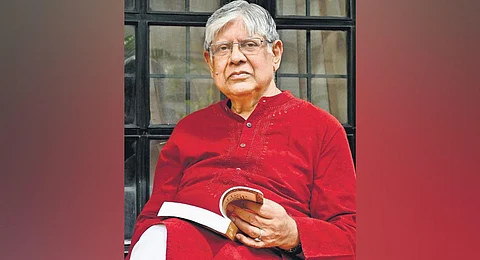

BENGALURU: When India and most of the rest of the world were stuck in the middle of the Covid years, Abhijit Sengupta, former Secretary at the Ministry of Culture, began working on his historiography. “It was the time of ‘post truth’; the reworking of our history had begun.
In 2016, in some textbooks in Rajasthan, chapters pertaining to the first Prime Minister of India were removed. In 2019-20, the NCERT reportedly decided to cut certain chapters from its Class 9 history textbook. ‘Where were we going?’, I had wondered. I asked a couple of professors of history, whom I knew if they would write about today’s India, but there was no response.
So I decided, as a citizen, to record the events of our times as I understood them. The book begins in 1857, with the first war of Independence, as Savarkar had termed it,” shares Sengupta about his book, The Queen of All Nations: A Brief View of Modern India for Young Indians.
Released recently, Sengupta says due to the preconditions of Covid during the times when it was written, he had largely relied on online material for his research. But why did he choose to write for the younger generation? “It is the young people of India, the millennials, the Gen Z, who are the most vulnerable in a ‘knowledge game’.
They would tend to accept what is told to them as the ‘truth’, but what is that truth? It is the young people who must take our nation forward. It must be their democratic world of equity and equality, they must be aware of what brought us to the times we are living in,” he says. The Queen of All Nations has been published by AuthorsUpFront.
A longtime Bengalurean, Sengupta grieves about the declining readership in the city. “In cities we have two worlds of literature, the English literary scene and the vernacular. In both these worlds, we have outstanding writers. A few of them are blessed with the capacity to write in both languages. In English, which I am more familiar with, we have many of India’s best authors who live in Bengaluru.
The recent efforts at bookstore crawling are remarkable; Bengaluru has Church Street and then Avenue Road for Kannada books. And yet, there is such an effort required to get young people to read,” he explains, adding that his favourite bookstore in the city was the now-shut Premier Bookshop, but now the pleasure of browsing is gone for him.
In this ‘post-truth’ era, where, according to Sengupta, ‘the need for data accuracy, for factual objectivity, and the prevention of mythmaking is most essential’, the senior IAS officer says his experience as an administrator helped him pen his book. “My larger experience as an administrator certainly helped me put the administration of our nation in perspective.
The modern history of India is so much a question of appreciating the laws of the land, and how quickly one law led to another. In one specific matter, where the Ministry of Culture was involved, I was able to refer to the Dramatic Performances Act, an ancient British law that still exists, a sign of colonial control. I had begun with a set of discussions to try and remove the law from the statute books, but could not go far before I retired, ” he concludes.
The Queen of All Nations: A Brief View of Modern India for Young Indians is Abhijit Sengupta’s third book. His first two being In Order Of Appearance: A Compendium of Indian Playwrights in English (only available as an e-book) and A to Z, a book about the special aspects of the English language.